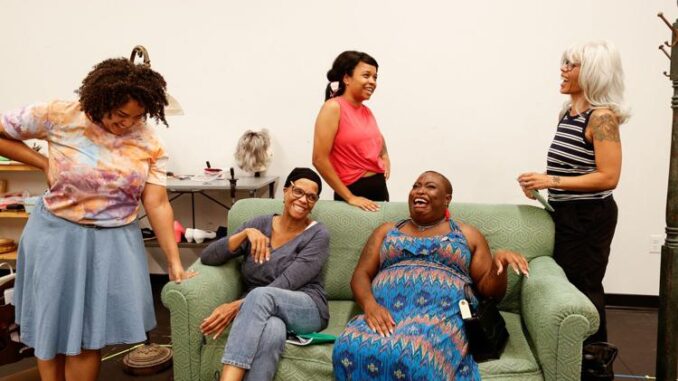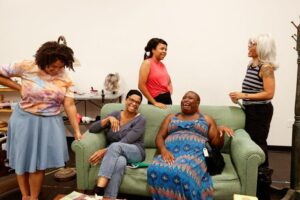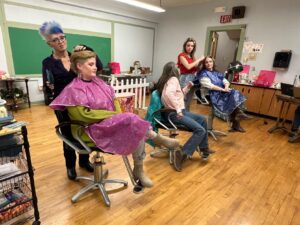
All-Black cast of ‘Steel Magnolias’ opens on Colorado Springs stage
There’s something about sitting in a beauty shop, getting your hair done, that makes people feel like spilling their guts and tears.
That’s the setting for Robert Harling’s play, “Steel Magnolias,” which debuted on Broadway in 1987 and became the beloved 1989 film starring Julia Roberts, Sally Field, Dolly Parton and others.
“’Steel Magnolias’ is at its most perceptive in offhand moments, as when one woman, caught up in her own problems, says, ‘I just can’t talk about,’ and the others reflexively respond in unison: ‘Of course you can.’ ‘Steel Magnolias’ is an amiable evening of sweet sympathies and smalltown chatter,” wrote New York Times critic Mel Gussow in 1987.
The company’s version is set in a Black beauty shop in Louisiana and features an all-Black cast and director from around Colorado. It runs through Oct. 15 at Ent Center for the Arts.

The play differs from the movie in two noticeable ways: There are no men and the whole thing takes place in Truvy’s Beauty Spot over the course of three years. M’Lynn (Marisa Hébert) and her daughter, Shelby (Carla Brown), are at the heart of the show, as Shelby plans her wedding and eventual pregnancy, despite being warned by her doctor it will jeopardize her health due to her diabetes. Ouiser (Latifah Johnson) and Clairee (Mary Louise Lee) bicker their way through their friendship, while beauty shop assistant Annelle (Desirée Myers) goes from shy, new girl in town to a repentant Christian. Conflicts come and go, all while Truvy (Cheerish Martin) gives them a wash and set.
Harling’s comedy drama is based on the death of his 33-year-old sister, who got married and decided to have a baby, despite doctors’ insistence it wouldn’t be wise for somebody with Type 1 diabetes. After giving birth, her circulatory system and kidneys began to fail. A kidney transplant from her mother and dialysis didn’t help save her, and she died in 1985.

“It’s rare there are six women on stage, and in our case, six women of color on stage,” Hébert said. “It is about their lives and how they’re living and relate to one another, not necessarily how they relate to the world or the men in their lives.”For director Lynne Hastings, a Black barbershop or beauty shop offers a completely different experience than its White counterparts. In Black culture, it’s a community gathering space, where you can find family that isn’t necessarily related to you by blood.
“Even if you don’t have an appointment, you stop by just to see what’s going on. It’s like church,” Hastings said. “There’s a familiarity and family that is built in that space. It’s about that in the play, but it’s also about sisterhood and women lifting each other up, holding each other when they need to be held, giving each other a shoulder to cry on, cheering each other up when they need it. It’s about the strength of women in numbers.”
